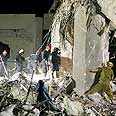
Taba Hilton hotel following terror attack
צילום: רויטרס
‘Sinai attackers failed to enter Israel’
Report says terrorists used washing machine timers, gas cylinders, and mobile phones in 2004 attacks on Sinai resorts that left 34 people dead
CAIRO, Egypt - Terrorists targeted resorts in the Sinai desert frequented by Israelis because they failed to enter the Palestinian territories to launch attacks on Israel from there, an Egyptian prosecutor's report said Saturday.
Two of the Egyptian terrorists will stand trial for their roles in the last year's bombings at resorts in Sinai, in which 34 people were killed, among them at least 10 Israelis.
A report prepared by the Egyptian prosecution and published by the daily pro-government al-Ahram newspaper claims the plotters allegedly gave up trying to infiltrate the Palestinian territories seven months before the attacks occurred on Oct. 7.
They set off explosives deep in the Sinai desert during months of planning and rehearsing the attacks, the report said.
Two Egyptians, Mohammed Gaber Sabbah and Mohammed Abdullah Rabaa, will appear before Egypt's State Security Court, while a third who remains at large will be tried in absentia.
No date has been set for the trial, which will be viewed by an emergency court where no appeals are accepted.
Remote-controlled detonation
The two men confessed to authorities that they began recruiting people to join in the attacks from the northern Sinai town of al-Arish, to target holidaying Israelis in the south of the Sinai, the report claims.
Many Israelis cross into Taba in Egypt, just over the border from the Israeli tourist town of Eilat, to snorkel or dive at the Red Sea resort, or to go hiking near Bedouin camps.
According to evidence gathered by the prosecution, Iyad Saleh, the Palestinian mastermind of the attacks, and his two Egyptian aides, recruited Sabbah, a guard in at a water plant, and Rabaa, a metal worker, to prepare the explosives used in the March 2004 attacks.
Two other people involved in carrying out the attacks were killed in February while on the run from Egyptian security forces, the report said.
Using washing machine timers, mobile phones and modified gas cylinders, the terrorists attacked the Taba Hilton hotel, damaging its lobby and facade, and detonated by remote control two vehicles at two other resorts, about 50 kilometers (31 miles) to the south, the report said.
They used TNT and explosives salvaged from war armaments that had been purchased from Bedouins, the report said.
Suspected Bedouins still detained
Saleh and one of his aides, Suleiman Ahmed Saleh Flayfil, died in the attack on the Taba Hilton. A third, Mohammed Ahmed Flayfil, remains at large.
Israel has long complained that Egypt has failed to stop the smuggling of weapons via tunnels dug under the border between Egypt and the Gaza Strip.
Since the October attacks Egyptian security forces have been battling terrorists in the hills of the Sinai, trying to rout those involved in the attacks. At least one wanted terrorist remains at large and scores of people have been arrested.
Al-Arish residents claim many of those in detention - Bedouins from the area - have nothing to do with the attacks and their relatives have demonstrated weekly for their release.
Human rights groups put the number of detainees at 2,400, while the government refuses to release any figures.










